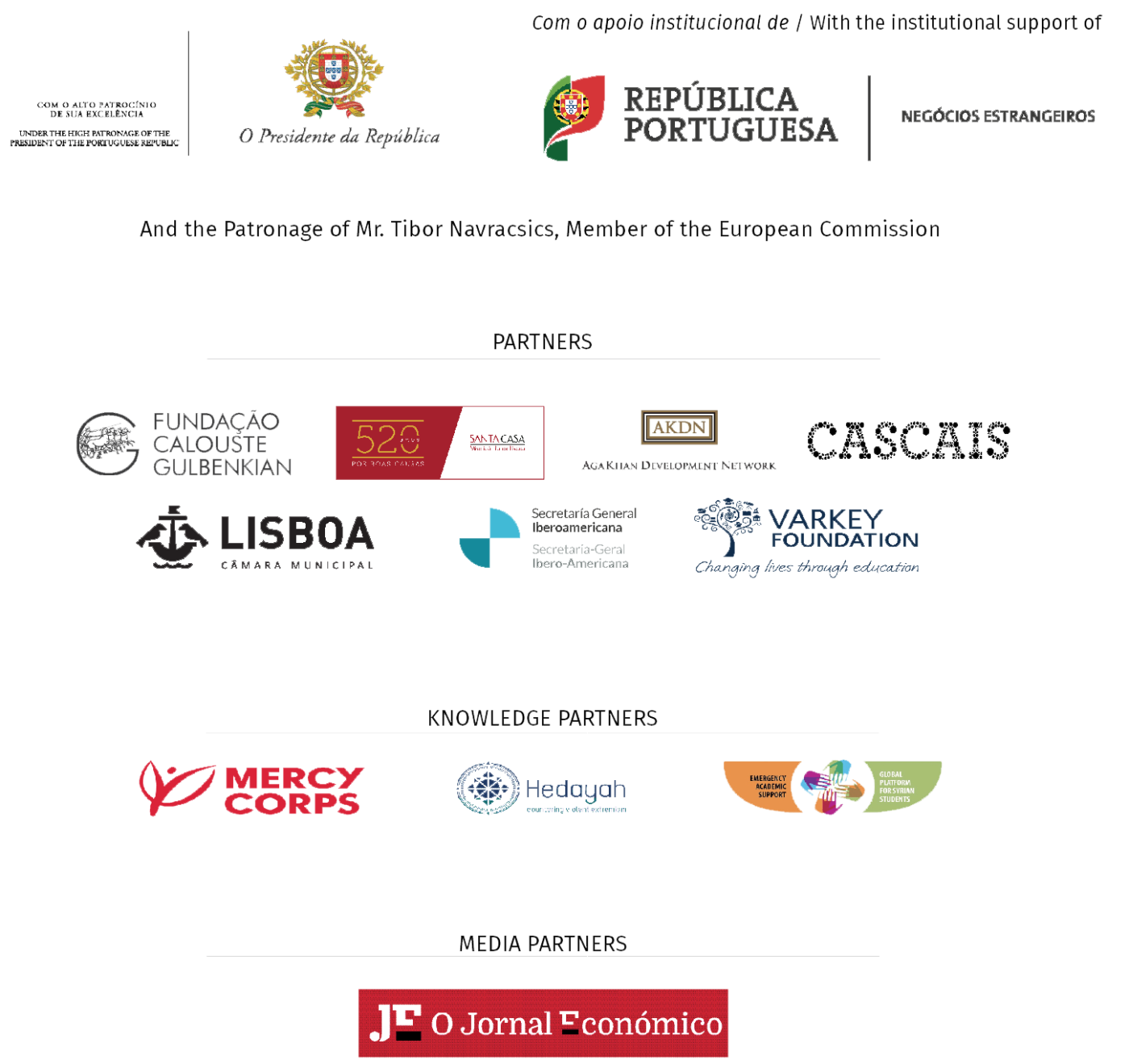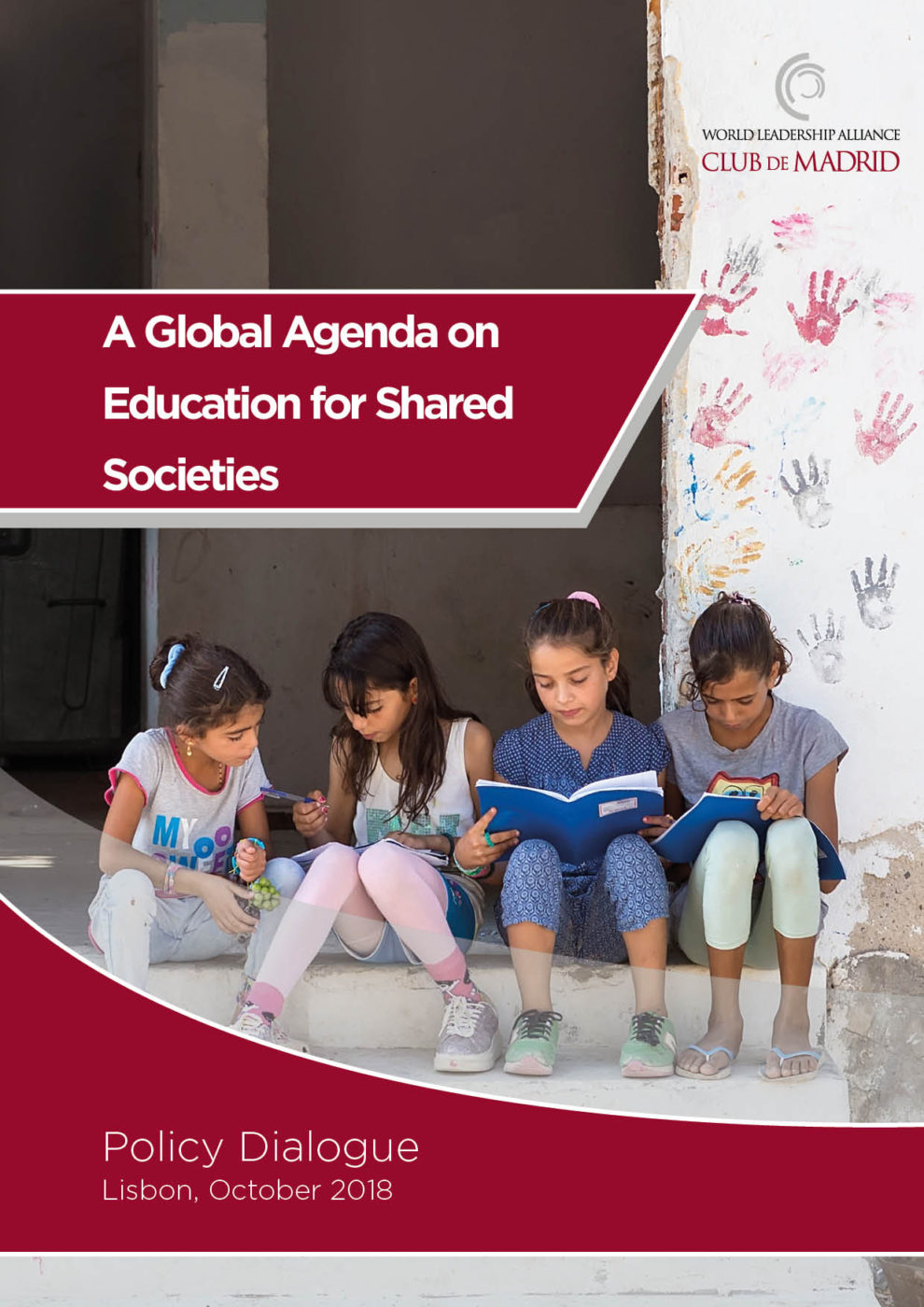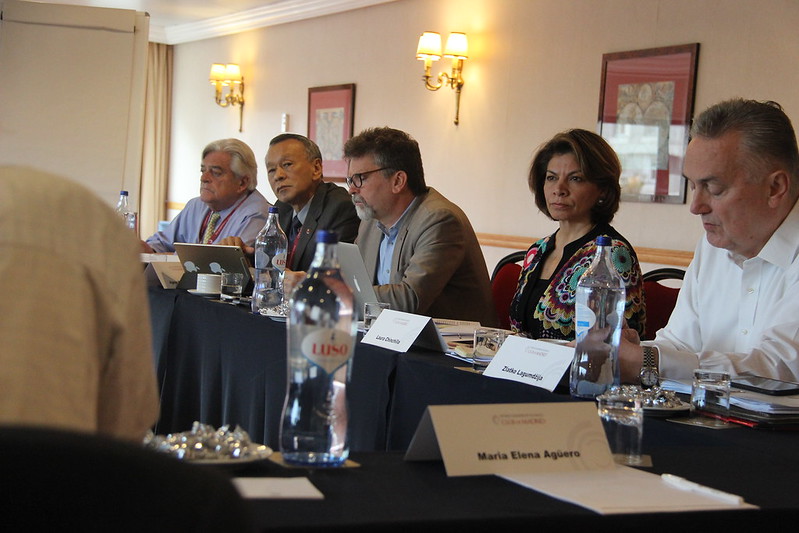Thirty former Heads of State and Government led the ‘Education for Shared Societies’ Policy Dialogue that took place on October 16-17th in Lisbon, Portugal. The event gathered over 150 participants, among policymakers and expert practitioners, educators and youth leaders, media, private sector representatives and civil society. Club de Madrid (CdM) now presents the Global Agenda on Education For Shared Societies, the outcome of such a flagship event.
The dialogue was organized by CdM in partnership with the Calouste Gulbenkian Foundation, under the High Patronage of His Excellency the President of the Republic of Portugal and the Patronage of the European Commissioner for Education. It aimed to mobilise political will around global education for more inclusive societies.
Education for Shared Societies Policy Dialogue – Outlook
Overview
A shared society is one in which everyone has a sense of belonging and shared responsibility, shielded from the dynamics of social exclusion, inter-group tensions and violence. Club de Madrid (CdM) began its Shared Societies Project (SSP) a decade ago, as part of its work building peace and democracy. This integrates political, social, economic and environmental dimensions, with social inclusion at its core. The organization is now turning its spotlight on education, as one of the strongest enablers to foster social cohesion and lessen dangers of exclusion and elitism.
At global level, transformative efforts towards inclusive societies have become more political, reflected in the Agenda 2030 for Sustainable Development, to which countries have made a commitment and on which they are accountable. Therefore, the involvement of leaders and duty bearers will be crucial for social change and creation of enabling environments, which supports innovation and creativity for a better society. More than a mere call for action, this project locates responsibility with key actors and institutional frameworks to lead social change. The E4SS Agenda will focus on driving engagement on education for all as a catalyst to address challenges affecting the advancement of communities and wellbeing of citizens.
The overarching topic of the Policy Dialogue, “Education for Shared Societies”, refers to the role of education as an essential lever to build inclusive democratic societies, with freedom to express their differences in a common search for social cohesion. Obstacles to achieving shared societies are multiple and complex but, in this Policy Dialogue, CdM honed in on three particularly taxing challenges putting social cohesion under stress across the globe and which, at the very outset, must be tackled through education – radicalization and violent extremism (EPVE); migration, refugee flows and internal displacements; and the need for digital resilience in an increasingly interconnected world. Three working groups drafted key components of an agenda with policy changes for each area, discussed by educators, policymakers, CdM Members, and experts, and incorporated ideas during the Action Labs organized at the Policy Dialogue.
Looking forward, the results of deliberations will be brought into a Global Agenda on Education for Shared Societies on how 21st century education can best serve to build inclusive, democratic societies. This Agenda will serve as a useful instrument in leveraging political commitment to transformative education policies and to the advancement of Agenda 2030’s vision of ‘leaving no one behind’, ensuring the continuity of the project globally.
Working Group Conclusions
1) Education for Preventing Violent Extremism: Education can be a powerful tool in preventing violent extremism by creating an inclusive and equitable learning environment. Access to quality education for all students is a critical first step in EPVE but it is not sufficient. Appropriate educational approaches can help tackle underlying factors of violent extremism, including discrimination, prejudices and feelings of exclusion. Based on discussions and research, the Working Group formulated five general policy proposals and concrete measures to address these challenges and cultivate resilience-based education models aimed at preventing violent extremism:
- Incorporate EPVE approaches into institutional structures like policy-making and funding mechanisms;
- Promote open-mindedness, inclusiveness, and respect and understanding of different religions, cultures, ethnicities and other identities as key educational components;- Put students’ needs at the center of any intervention for preventing violent extremism, and avoid securitizing youth and students;
- Enable policy changes welcoming interactive learning styles and teaching pedagogies conducive for building resilient students;
- Involve the broader community and local civil society in EPVE efforts where relevant.
2) Inclusive Education for Migrants, Refugees, and IDPs: A quality inclusive education is fundamental for promoting the values of a shared society. Education transforms lives through economic opportunity and hope. Yet, for those children and youth most in need of this hope: refugees, migrants, stateless or internally displaced persons, and asylum seekers, education suffers from too many prohibitive barriers to entry and institutional deficiencies hampering the quality of the education delivered to these groups. Based on WG discussions and research, the following policy proposals focused on access and inclusion and quality were identified to tackle challenges and cultivate education systems fit to service refugees, migrants, and IDPs:
- Increase international cooperation, solidarity and sustained investment in inclusive education;
- Address the challenges of education in emergencies through a systemic approach;- including refugees in national education systems and plans, starting with ensuring language and cultural competence;
- Flexible registration and recognition of home countries certificates;
- Support non-formal education to provide opportunities for children and youth for whom the formal system is inaccessible;
- Assist host/receiving communities in meeting additional burden and the specific needs of refugees, IDPs and migrants;
- Target recruitment and training of refugee, IDP and migrant teachers;
- Promote direct student and parent’s participation and ownership of inclusive education;
- Teach in the language of the national system where possible, but provide learning about home and host culture, and inter-cultural awareness and appreciation;
- Training of refugee teachers and training of teachers about refugees and their rights;
- Understand and address internal practical barriers to inclusion such as facilities, attitudes, harassment, and bullying.
3) Digital Resiliency for Shared Societies: Resilience refers to the capacity to deal with threats. The notion of digital resilience covers a number of fields from cybersecurity to political influence and business risk. From the perspective of Education for Shared Societies, there is a growing concern with the accelerated digitalization of social interactions. Policy Dialogue discussion focused on two main areas of concern described below and produced the following policy proposals:
- Enhance digital resilience by bridging the digital divide through the promotion of the use of digital technologies as part of the curriculum;
- Educate users of digital technologies to foster increased awareness of the risks of the digital environment, as well as an enhanced capacity to manage these risks through responsible online behaviour.
Global Leadership for Action Taking Education for Shared Societies Forward
Leveraging education to foster inclusion and social cohesion is a laudable objective in any society. 21st century learner experience encompasses high levels of uncertainty. The growth of interconnectivity and digitalization requires the engagement of students as global citizens, equipped with an appropriate set of skills to deal with global interdependence, diverse identities and cultures, and unpredictable societies. Preserving a democratic and inclusive society depends also on addressing the mismatch in the labour market, and meeting citizen’s expectations and possibilities. Today, it appears that the only certainty lies in the fact that most of the things we learn and do will not be needed in the future. The E4SS initiative, CdM Members and its partners have committed to promote more inclusive and resilient education frameworks that will allow to be better prepared to face this uncertainty. In this sense, Club de Madrid has key ideas discussed in the Policy Dialogue into concrete policy proposals in the framework of an education for shared societies.
The Members of CdM will present and discuss the ideas and proposals of the Agenda in relevant global and regional forums including the seventh UN High-level Political Forum on Sustainable Development (HLPF 2019), as well as engage with national governments and actors to discuss its potential implementation in specific contexts. Club de Madrid and its Members are committed to mainstream key recommendations described in the Agenda into its programmatic priorities. Moreover, the organization will continue its cooperation with current and new partners to further elaborate and improve the proposals presented in the Agenda and to convert its policy ideas into concrete new projects and initiatives.
VIDEOS OF THE PLENARY SESSIONS
Plenary Session 1/4
Plenary Session 2/4
Plenary Session 3/4
Plenary Session 4/4
RELATED VIDEOS
“In our world today, there is no better investment”, said Secretary-General of the UN, António Guterres, also a Member of Club de Madrid, in a video message welcoming our ‘Education for Shared Societies Policy Dialogue’
“Learning to be a fully-fledged citizen is a complex mix of knowledge and attitudes. It starts in the family and the classrooms. It is about experiencing respect and tolerance and others as well as feeling proud of one’s own culture”, said Tibor Navracsics, European Commissioner for Education, Culture, Youth and Sports in a video message also sent for CdM’s Policy Dialogue.
The Global Platform for Syrian students, an initiative created by our Member and former President of Portugal, Jorge Sampaio, sent a video on their Rapid Response Mechanism for Higher Education in Emergencies.
RELATED LINKS
‘Education for Shared Societies’ Policy Dialogue: Information and social media materials
‘Education for Shared Societies’ Policy Dialogue: Press release
‘Education for Shared Societies’ Policy Dialogue Kick off
PRESS COVERAGE
In Spanish
Grynspan, Barroso y Guterres piden en Lisboa potenciar el acceso a educación
Felipe González aboga por las humanidades para afrontar la revolución digital
In Portuguese
“A melhor vacina contra a exclusão é a educação”, afirma presidente da Calouste Gulbenkian
Cavaco Silva quer escola no “centro da vida em comunidade” com descentralização
Antigos chefes de estado reunidos para discutir o futuro da educação
Discurso público tem “uma linguagem cada vez mais ordinária”
Durão Barroso critica “futebolização” do discurso político
Iveta Radicová: “Senti pressões de grupos criminosos todos os dias”
FLICKR GALLERY
See a collection of the best pics of the ‘Education for Shared Societies’ Policy Dialogue in the gallery below



